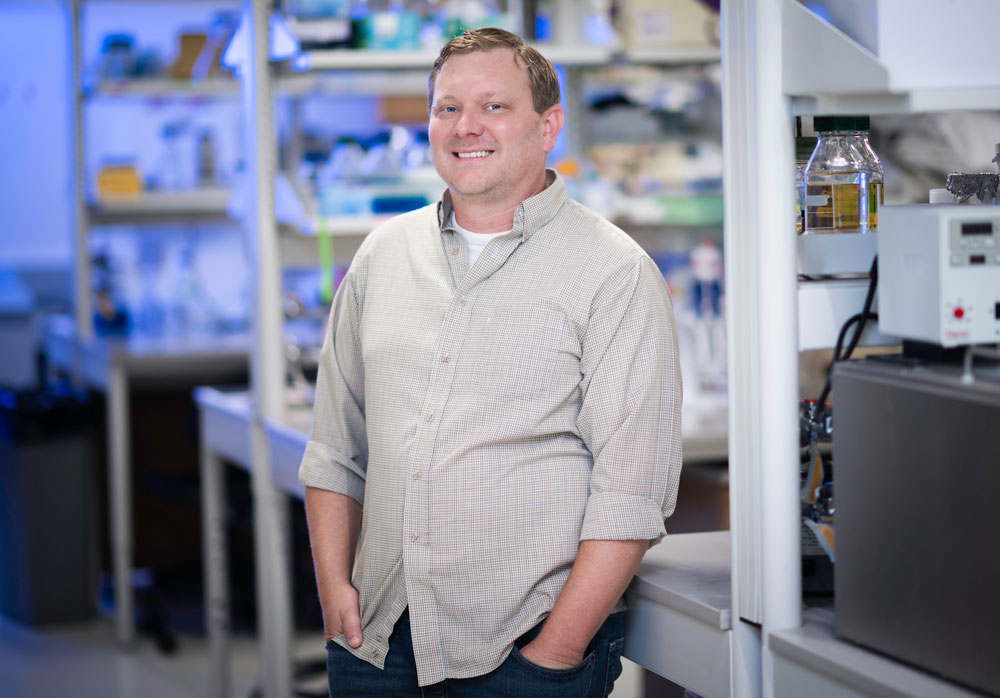DENTON (UNT), Texas — University of North Texas assistant professor Calvin Henard earned a more than $800,000 grant through the U.S. National Science Foundation’s Faculty Early Career Development Program.
The NSF CAREER award is the most prestigious recognition for early career research faculty. It is granted to selected tenure-track faculty who haven’t earned tenure and whose scholarly products have a high impact within their discipline and/or on society. Including its most recent honoree, UNT has 26 researchers who have earned NSF CAREER awards over the years.
 An assistant professor of microbiology and researcher in UNT's BioDiscovery Institute, Henard's award-winning project will research organic and inorganic carbon metabolism
in methanotrophic bacteria. Methanotrophic bacteria eat methane, a greenhouse gas
and byproduct of petroleum production, landfill and wastewater treatment processes.
An assistant professor of microbiology and researcher in UNT's BioDiscovery Institute, Henard's award-winning project will research organic and inorganic carbon metabolism
in methanotrophic bacteria. Methanotrophic bacteria eat methane, a greenhouse gas
and byproduct of petroleum production, landfill and wastewater treatment processes.
Current practices often see that methane is either directly released to the atmosphere, flared, or simply burned and converted to carbon dioxide (another greenhouse gas) to generate electricity. Henard hypothesizes that using bacteria to eliminate the methane has the potential to yield more lucrative results.
"Maybe a different technology like this would make it so we could use that gas — which is currently just wasted in many cases — for something more valuable," Henard says. "Can you make more money off of it? Can the landfill or wastewater treatment make their operational costs significantly less because they're able to make something that's valuable?"
In addition to investigating the metabolic mechanisms within the bacteria that optimize methane and carbon dioxide consumption, Henard's team will engineer the bacteria to convert the gases to valuable products. The idea of using the resulting microbial biomass to create something like bioplastics, for example, aligns well with the mission of the BioDiscovery Institute.
"The goal of the BioDiscovery Institute itself is to use biology to generate sustainable bioproducts," Henard says. "My work aligns with this goal by using bacteria to convert waste gases into bioproducts that benefit society."
Beyond the results of the research itself, the educational benefits of this award will be far-reaching. In addition to covering research materials, the award will fund a graduate student to assist Henard in the lab.
"Someone will get their Ph.D. because of this and hopefully go on to do some amazing things and contribute to society," Henard says. "There'll also be several undergraduate students who will get trained because of this grant by working in the lab."
The educational benefits will go even further as part of the funding will be used to create a course-based undergraduate research experience (CURE) that will be offered starting in the Spring 2026 semester. Henard says undergraduate students grasp science concepts better when they see how the knowledge is gained and tested through active participation in research rather than simply hearing about it in lectures.
"Within this five-year grant period, the thought is over 100 students will be impacted directly," Henard says. "The idea of that continuing in perpetuity, it really is going to be thousands — that is the hope — over time that will be able to have hands-on research opportunities within the department that wouldn't otherwise be able to occur."
This will be one of few CUREs that UNT has ever offered, and Henard says it will provide students the unique opportunity to study both biology and engineering to gain interdisciplinary experience.
“Science is becoming more interdisciplinary,” Henard says. “We can’t just work in vacuums anymore. It’s much better and more effective when science is done with multiple brains from different disciplines seeing the problem in different ways, and that's what this CURE will be."